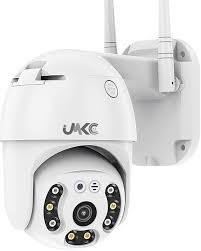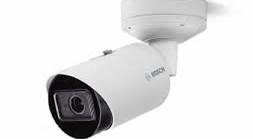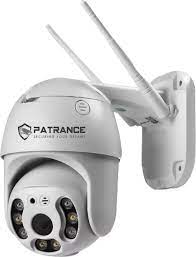Outdoor home surveillance cameras have become an essential component of modern home security systems, providing homeowners with peace of mind and a sense of security. These cameras are specifically designed to withstand various weather conditions while effectively monitoring the exterior of a property.
One of the key benefits of outdoor surveillance cameras is their ability to deter potential intruders and burglars. The presence of visible cameras can act as a powerful deterrent, discouraging criminals from attempting to break into a home. In addition, these cameras can capture high-quality footage that can be used as evidence in the event of a security breach.
Many outdoor surveillance cameras are equipped with advanced features such as night vision, motion detection, and two-way audio capabilities. Night vision allows the cameras to capture clear footage even in low-light conditions, ensuring round-the-clock surveillance. Motion detection technology alerts homeowners to any suspicious activity detected within the camera’s field of view, providing real-time notifications via mobile devices.
Furthermore, some outdoor surveillance cameras come with two-way audio functionality, allowing homeowners to communicate with visitors or potential intruders remotely. This feature can be particularly useful for monitoring deliveries or deterring unwanted guests from entering the property.
With the advent of smart home technology, many outdoor surveillance cameras can be integrated with existing smart home systems for seamless control and monitoring. Homeowners can remotely access camera feeds, adjust settings, and receive alerts through dedicated mobile apps or web interfaces.
In conclusion, outdoor home surveillance cameras play a crucial role in enhancing home security by providing continuous monitoring and deterrence against potential threats. With their advanced features and integration capabilities, these cameras offer homeowners a comprehensive solution for protecting their property and loved ones.
Top 6 FAQs About Outdoor Home Surveillance Cameras Answered
- What is the best camera for home security at night?
- Do all security cameras need Wi-Fi?
- What is the difference between a security camera and a surveillance camera?
- Is it better to have wired or wireless security cameras?
- Can I put CCTV camera outside my house?
- Will CCTV work without internet?
What is the best camera for home security at night?
When it comes to choosing the best camera for home security at night, it is essential to look for a camera with advanced night vision capabilities. Cameras equipped with infrared technology or low-light sensors are ideal for capturing clear and detailed footage in low-light conditions. Additionally, consider a camera with adjustable settings for night vision to ensure optimal performance based on the environment. Look for features such as motion detection and alerts to notify you of any activity detected during the night. Ultimately, the best camera for home security at night is one that offers reliable night vision performance, motion detection, and seamless integration with your existing home security system.
Do all security cameras need Wi-Fi?
One frequently asked question regarding outdoor home surveillance cameras is, “Do all security cameras need Wi-Fi?” While many modern security cameras rely on Wi-Fi connectivity for remote monitoring and control, not all cameras require a Wi-Fi connection. There are various types of security cameras available, including wired and wireless options that operate independently of Wi-Fi. Wired cameras are directly connected to a recording device or monitor using cables, eliminating the need for Wi-Fi connectivity. These cameras are suitable for areas with poor Wi-Fi signals or where a more reliable connection is required. On the other hand, wireless security cameras utilize Wi-Fi to transmit footage to a cloud storage service or mobile device for remote viewing. Ultimately, the choice between Wi-Fi-enabled and non-Wi-Fi security cameras depends on individual preferences and specific surveillance needs.
What is the difference between a security camera and a surveillance camera?
One frequently asked question regarding outdoor home surveillance cameras is the difference between a security camera and a surveillance camera. While these terms are often used interchangeably, there is a subtle distinction between the two. A security camera is typically designed to capture and record footage in a specific area for the purpose of monitoring and protecting property against potential threats such as theft or vandalism. On the other hand, a surveillance camera encompasses a broader scope of monitoring activities, including real-time observation, analysis, and recording of multiple areas or locations for enhanced security and situational awareness. In essence, while both serve the primary function of monitoring and safeguarding property, a security camera focuses on specific areas, whereas a surveillance camera offers comprehensive coverage and monitoring capabilities.
Is it better to have wired or wireless security cameras?
One frequently asked question regarding outdoor home surveillance cameras is whether it is better to opt for wired or wireless security cameras. Both wired and wireless cameras have their own set of advantages and considerations to keep in mind. Wired cameras are known for their reliable and stable connection, as they are physically connected to the property’s power source and network. This ensures continuous recording and monitoring without the risk of signal interference or disconnection. On the other hand, wireless cameras offer greater flexibility in terms of installation and placement, as they do not require complex wiring. They can be easily moved or repositioned as needed, providing versatile surveillance options. Ultimately, the choice between wired and wireless security cameras depends on individual preferences, budget constraints, and specific requirements for home security.
Can I put CCTV camera outside my house?
Yes, you can absolutely install CCTV cameras outside your house for enhanced security and surveillance. Outdoor CCTV cameras are specifically designed to withstand various weather conditions and provide reliable monitoring of the exterior of your property. By strategically placing these cameras around your home, you can deter potential intruders, monitor outdoor activities, and enhance overall safety and security. With advancements in technology, outdoor CCTV cameras offer features such as night vision, motion detection, and remote access capabilities, making them a valuable addition to any home security system.
Will CCTV work without internet?
One commonly asked question regarding outdoor home surveillance cameras is whether CCTV systems can function without an internet connection. The answer is yes, CCTV cameras can work without the need for an internet connection. While many modern surveillance cameras offer remote viewing and cloud storage capabilities that require an internet connection, basic CCTV systems can operate independently without internet access. These standalone systems typically record footage locally to a digital video recorder (DVR) or a network video recorder (NVR) and do not rely on an internet connection for their core functionality of capturing and storing video footage.



